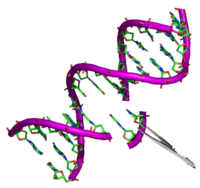
Photo from wikipedia
The use of formulations containing botanical products for controlling insects that vector human and animal diseases has increased in recent years. Plant extracts seem to offer fewer risks to the… Click to show full abstract
The use of formulations containing botanical products for controlling insects that vector human and animal diseases has increased in recent years. Plant extracts seem to offer fewer risks to the environment and to human health without reducing the application strategy’s efficacy when compared to synthetic and conventional insecticides and repellents. Here, we evaluated the potential of extracts obtained from caninana, Chiococca alba (L.) Hitchc. (Rubiaceae), plants as a tool to be integrated into the management of Aedes aegypti, one of the principal vectors for the transmission of arborviruses in humans. We assessed the larvicidal and repellence performance against adult mosquitoes and evaluated the potential undesired effects of the extracts on non-target organisms. We assessed the susceptibility and predatory abilities of the nymphs of Belostoma anurum, a naturally occurring mosquito larva predator, and evaluated the C. alba extract’s cytotoxic effects in mammalian cell lines. Our chromatographic analysis revealed 18 compounds, including rutin, naringin, myricetin, morin, and quercetin. The methanolic extracts of C. alba showed larvicidal (LC50 = 82 (72–94) mg/mL) activity without killing or affecting the abilities of B. anurum to prey upon mosquito larvae. Our in silico predictions revealed the molecular interactions between rutin and the AeagOBP1 receptor to be one possible mechanism for the repellent potential recorded for formulations containing C. alba extracts. Low cytotoxicity against mammalian cell lines reinforces the selectivity of C. alba extracts. Collectively, our findings highlight the potential of C. alba and one of its constituents (rutin) as alternative tools to be integrated into the management of A. aegypti mosquitoes.
Journal Title: Plants
Year Published: 2022
Link to full text (if available)
Share on Social Media: Sign Up to like & get
recommendations!